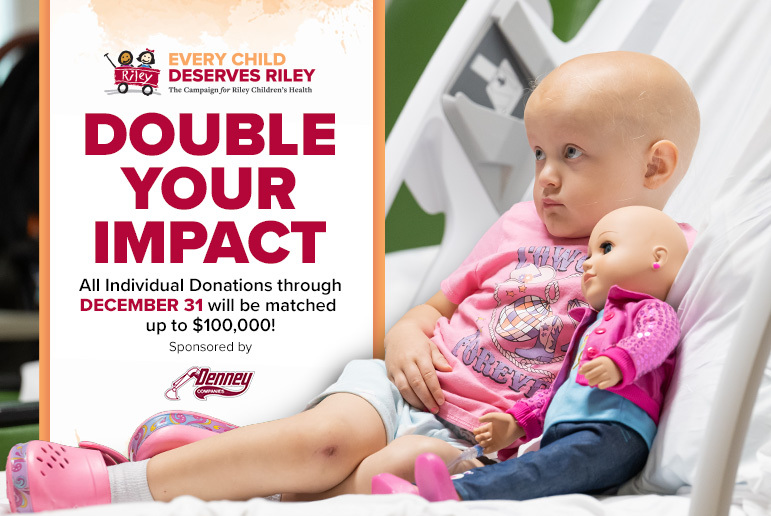Live to fight another day.

Throughout Riley Osmon’s leukemia treatment, his family relied on the mantra, “Live to fight another day.” It was no exaggeration, given they once said their goodbyes after being told he wouldn’t survive the night.
Riley has been a patient at Riley Children’s Health since a diagnosis of acute lymphoblastic leukemia (ALL) at 22 months old. He relapsed just before kindergarten and faced a life-threatening lung infection. By the time of his second relapse, Riley’s parents, Trent and Karrie, had begun looking into experimental treatments.
CAR-T therapy modifies patients’ immune T-cells so they seek and destroy the cells where the leukemia lives. It wasn’t yet available locally, so the Riley Children’s team connected the Osmon family to an Ohio hospital to arrange CAR-T treatment. That sparked an idea from Riley’s sister, Molly: Could she raise enough money to bring CAR-T to Riley Children’s? Her “Be Brave and Beat Cancer” event set a single-event Riley Children’s Foundation fundraising record for Indiana elementary schools. Those funds were key to launching the CAR-T program at Riley Children’s, led by Jodi Skiles, M.D., M.S.
Riley appeared quite healthy during CAR-T treatment, so it was a shock when the cancer returned. Dr. Skiles coordinated with a Washington hospital for a more advanced round of CAR-T. There, Riley faced brain swelling so severe that his medical team had never seen another patient like him survive.
But Riley did survive. He returned to Riley Children’s for a bone marrow transplant, which Trent called his “end boss,” reflecting Riley’s love of video games. Dr. Skiles built a pre-transplant regimen to keep Riley’s lungs as safe as possible, and Molly was his donor. After an extended period of isolation, Riley returned to school in person for the second half of third grade.
Today, Riley receives support from multiple specialists and the Riley School Program to navigate the side effects from treatment. “It’s something he’ll have to deal with the rest of his life,” Karrie shared. “We would love to see research continue to try to find better treatments.” His parents describe 12-year-old Riley as lighthearted and a leader. They hope his story will encourage other families who are still seeking answers.
Karrie credits the Riley Children’s team for their relentless and collaborative approach to her son’s care. “Ultimately, that’s what saved him,” she said, “their willingness to keep fighting, and working with other people to find what would be best for him.”
